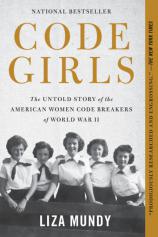Reading Group Guide
Discussion Questions
Code Girls: The Untold Story of the American Women Code Breakers of World War II

1. What particular skills and characteristics did the Army and Navy look for in the women recruited to their code-breaking programs? How were stereotypes about women employed or challenged in the recruitment effort?
2. How did World War Two affect personal and romantic relationships? What were Americans’ attitudes toward marriage then --- and did those attitudes change at all for the “code girls” generation?
3. Why do you think Dot Braden and Ruth “Crow” Weston became such great friends? If they had met in other circumstances or in peacetime, do you think they would have gotten along just as well?
4. Consider the various motivations Mundy cites for the women who signed up as code breakers. Do you think they differed from those of the men serving in America’s military then?
5. Some of the code girls were affected by the extended secrecy of their work. How might keeping secrets, however necessary, affect a person’s relationships or her identity in the world?
6. What were the particular successes and struggles of Agnes Driscoll? Why might she have eventually resorted “to extreme measures to retain her authority”?
7. What does it mean that the organizational hierarchy of Arlington Hall was relatively “flat”? How was this beneficial to the code girls?
8. Frank Raven, while acknowledging the skills of the “damn good gals,” also concluded that many of the code girls were “damn pretty gals.” What effect might this statement and the perspective of people like Raven have had on the women and their work?
9. Barnard’s Virginia Gildersleeve noticed in the marching WAVES “a remarkable cross section of the women of the United States of America, from all our economic and social classes...and from all our multitude of racial origins and religions.” What might have caused such diversity and cooperation, and how do you think this changed after the war, if at all?
10. What were the challenges for many of the women after the war?
11. Why do you think these women’s contributions to cryptanalysis remained a secret for so long?
12. Mundy suggests that “many of the code-breaking women...advance[d] the feminist movement.” Do you agree?
13. In January 2016, the American armed services finally lifted a ban on women serving in positions of direct combat. What challenges do you think women still face in the military today?
Code Girls: The Untold Story of the American Women Code Breakers of World War II
- Publication Date: October 2, 2018
- Genres: History, Nonfiction
- Paperback: 448 pages
- Publisher: Hachette Books
- ISBN-10: 0316352543
- ISBN-13: 9780316352543







